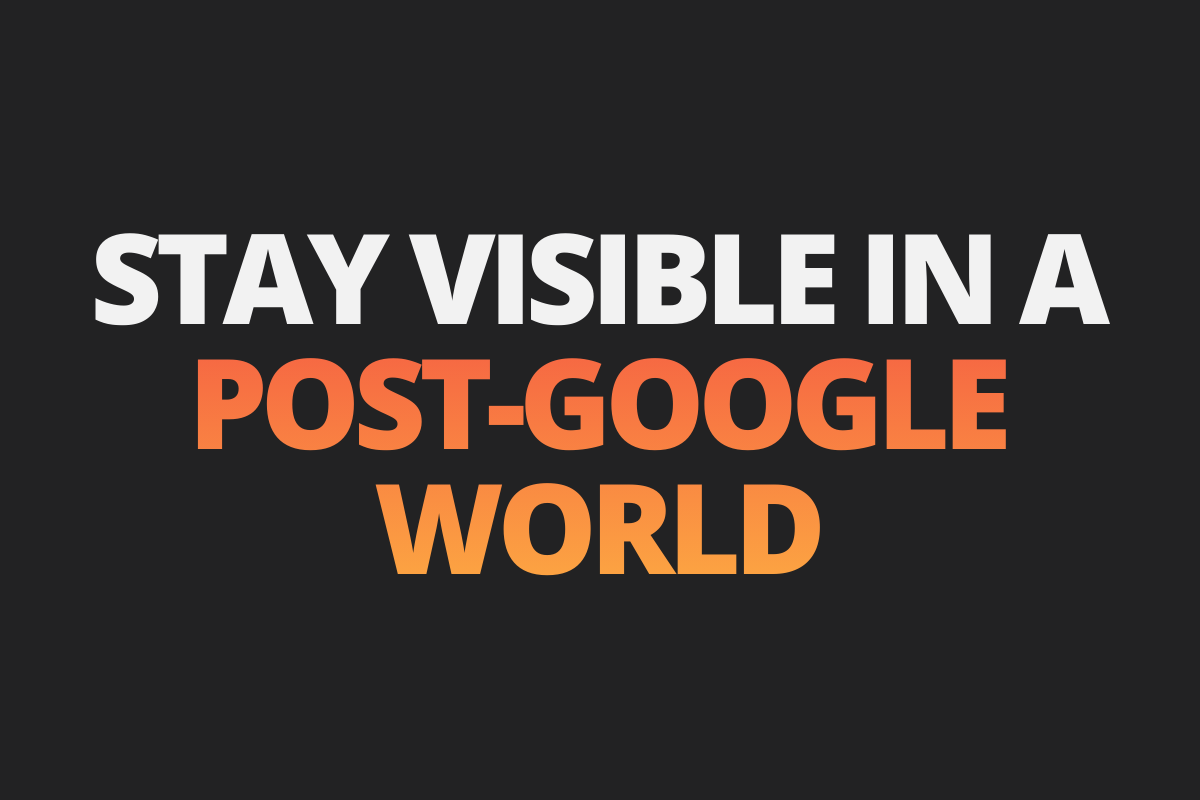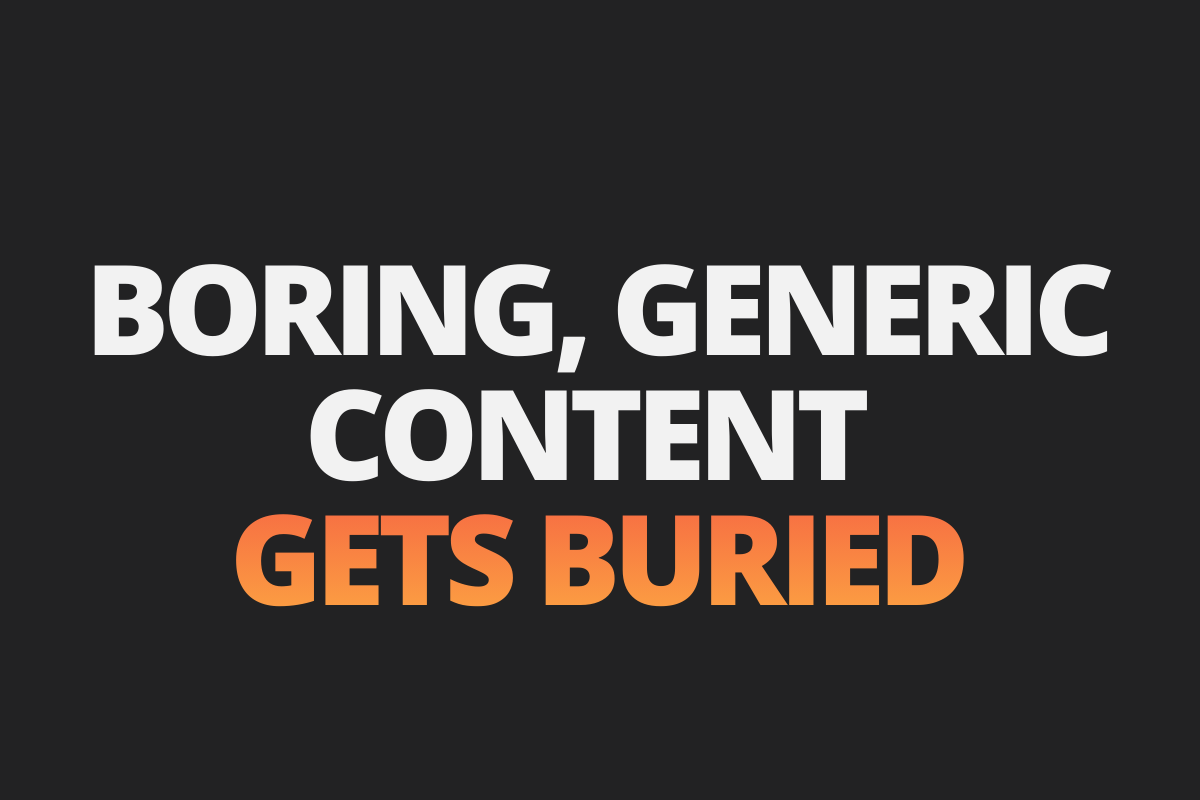AI Isn’t Killing SEO, Marketers Are.
Everyone’s pointing fingers at AI right now.
Click-through rates are dropping. Search results are getting swallowed by summaries.
Content marketers are panicking because everything they’ve built their strategy around just changed.
But here’s the truth no one wants to say out loud: AI is exposing our bad habits, and we don’t like it.
Years before ChatGPT could even write a sentence, we flooded the internet with content that didn’t need to exist. Blog posts written to hit invisible quotas, landing pages optimized for search engines instead of humans, and thought leadership with zero thoughts.
How ROI Obsession Ruined Content
It started with good intentions. Content marketing was supposed to build trust, teach the reader something useful, and help brands show up when and where it mattered.
Then came the dashboards, the KPIs, and the pressure to prove that every single piece of content was pulling its weight in revenue.
So we stopped writing to connect and started writing to convert.
The result? A sea of forgettable content. And marketers know it. According to the Content Marketing Institute, only 29% of marketers say their content strategy is “very successful”, with many citing pressure to produce too much, too often as the root of the problem.
Most Content Isn’t Bad, But It’s Not Good Either
Most brand content isn’t failing because it’s factually wrong or stylistically bad. It’s failing because it just doesn’t matter. It doesn’t solve a problem, challenge a belief, or say something that hasn’t been said a thousand times already.
And when content says nothing, it does nothing. No engagement. No shares. No citations.
Here’s what that looks like in practice:
| Bad Practice | Why It Fails |
|---|---|
| Rewriting top-ranking posts | No original insight and adds nothing new to the ecosystem |
| Keyword stuffing | Confuses users, signals low quality to AI |
| Word count padding | Prioritizes length over clarity |
| Calendar-driven posting | Quantity over usefulness leads to content fatigue |
And now we’re shocked that AI won’t cite this kind of content? Of course it won’t. Because this is just content marketing cosplay.
AI Doesn’t Hate You
Let’s get one thing straight: AI tools aren’t out to get you. They’re just trained to prioritize what people actually find useful.
Here’s what actually gets referenced by tools like ChatGPT, Perplexity, and Google’s AI Overviews:
- Answer-driven formatting: bullets, summaries, FAQs
- Clear expertise: authorship, transparency, citations
- Specificity over generalization: actual insights, not summaries of summaries
- Up-to-date, user-focused info: not recycled blog filler
If your post can’t confidently answer a question, it won’t show up in a summary.
How to Create Source-Worthy Content (the kind AI actually uses)
AI tools aren't just pulling random answers from the internet. They’re trying to help people.
That means your content has to help people, too.
If it’s not clear, credible, or genuinely useful to a human reader, it’s not going to be cited, quoted, or summarized by an AI.
If you want your content to be surfaced, cited, or summarized by AI tools, build with these principles:
| Do This | Not This |
|---|---|
| Answer specific questions your target audience is asking | Ramble through vague generalities |
| Include author bios and real expertise | Leave everything anonymous |
| Use bullets, FAQs, and summaries | Publish long paragraphs with no structure |
| Cite stats, sources, and original POV | Reword what everyone else has already said |
| Focus on clarity, not cleverness | Write for algorithms instead of people |
Ask yourself: Would I quote this? Would I trust this? Would I share this? If you answer no to one or more of these questions, why should AI?
Google Has Been Trying to Prepare Us
All of this might sound really familiar if you remember a year and a half ago, when you couldn’t open LinkedIn without seeing a dozen content marketers posting about Google’s new “helpful content update”.
In Google’s own words, “Google's automated ranking systems are designed to present helpful, reliable information that's primarily created to benefit people, not to gain search engine rankings, in the top Search results.”
To the End of Lazy Content
For years, we let algorithms dictate our strategies. We chased traffic instead of trust and prioritized volume over value. Somewhere along the way, we forgot that content was never supposed to be a numbers game; it was supposed to mean something.
Now, AI is forcing us to remember.
Because the content that survives in this new era? It’s the content that should’ve been winning all along. Helpful, thoughtful, human-first content that answers real questions and builds real trust.
This is our opportunity to stop gaming the system and start respecting the audience. To create fewer things that matter more. And to trade empty output for actual impact.
So no, it’s not the end of SEO. It’s a return to the roots of content marketing: clarity, connection, and usefulness.
The future belongs to the brands that make content worth quoting.
Recent Posts









